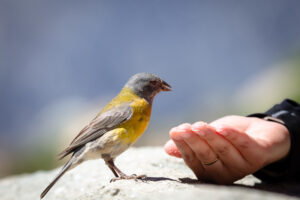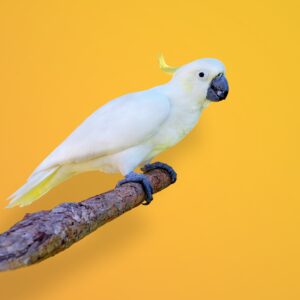
Bird’s Adoption Tips
When adopting birds from a rescue shelter, it’s crucial to research and understand the specific needs of the species you’re interested in. Consider factors such as size, temperament, diet, and housing requirements to ensure you can provide a suitable environment. Take your time interacting with potential adoptees to gauge compatibility and bond with the bird before making a decision. Be prepared for a commitment that may last decades, as many birds have long lifespans. Additionally, inquire about the bird’s history and any special care they may require due to past trauma or health issues. Finally, remember that patience, love, and consistency are key in building a trusting relationship with your new feathered friend.
What Environment you should provide to your bird?
Creating a suitable environment for your bird involves several key elements. Firstly, ensure that the cage or aviary is appropriately sized, providing enough space for the bird to move around, stretch its wings, and engage in natural behaviors like perching and flying short distances if possible.
Provide enrichment items such as toys, puzzles, and foraging opportunities to keep your bird mentally stimulated and prevent boredom. Offer a diverse diet consisting of fresh fruits, vegetables, seeds, pellets, and occasional treats, tailored to your bird’s species and nutritional needs. Maintain a clean environment by regularly cleaning the cage, replacing food and water, and providing opportunities for bathing or misting.

Ensure that the area where the cage is located is free from drafts, direct sunlight, and harmful fumes like those from non-stick cookware or aerosol sprays. Offer social interaction and mental stimulation through regular out-of-cage time, supervised play, and positive reinforcement training.
Create a calm and safe atmosphere by minimizing loud noises and stressful disturbances while providing a consistent daily routine. By prioritizing these aspects, you can offer your bird a fulfilling and enriching environment that promotes their health, happiness, and overall well-being.
Bird Grooming Tips:
Beak Maintenance: In many cases, birds will naturally wear down their beaks through chewing on toys and perches. However, some species may require occasional beak trimming if their beaks become overgrown or misaligned. Consult with an avian veterinarian for guidance on proper beak maintenance.
Feather Care: Provide your bird with regular baths or misting sessions to help keep their feathers clean and in good condition. Additionally, offer opportunities for your bird to preen, as this helps distribute natural oils and maintain feather health. If your bird’s feathers become damaged or excessively soiled, consult with a veterinarian for advice on grooming or feather trimming.
Monitor Overall Health: Regularly observe your bird for any signs of illness or discomfort, such as changes in behavior, appetite, or appearance. Promptly address any concerns by seeking veterinary care.
Bonding and Training: Use grooming sessions as opportunities to bond with your bird and build trust. Offer treats and praise to make grooming a positive experience, and gradually introduce grooming routines to your bird’s daily care regimen.
Nail Trimming: Trim your bird’s nails regularly to prevent them from becoming overgrown and causing discomfort or injury. Use specialized bird nail trimmers and be cautious not to cut too close to the quick, which contains blood vessels and nerves.
Remember to always handle your bird gently and with patience during grooming sessions. If you’re unsure about how to properly groom your bird, consult with an avian veterinarian or seek guidance from experienced bird owners.
Nutritious And Healthy Diet that you can Provide to your Birds:
High-Quality Pellets: Pelleted diets formulated specifically for your bird’s species provide a balanced mix of nutrients, including vitamins, minerals, and proteins. Choose pellets that are appropriate for your bird’s size and species.
Fresh Vegetables and Fruits: Offer a variety of fresh vegetables and fruits daily. Dark leafy greens like kale, spinach, and Swiss chard are rich in vitamins and minerals. Other nutritious options include carrots, bell peppers, broccoli, apples, berries, and oranges. Wash fruits and vegetables thoroughly and remove any seeds or pits that could be toxic to birds.
Healthy Seeds and Grains: While seeds should not be the primary component of your bird’s diet, they can be offered as occasional treats or part of a balanced diet. Nutritious options include millet, safflower seeds, and flaxseeds. Avoid seed mixes with high-fat content and offer seeds in moderation.
Protein Sources: Birds require protein for muscle development and overall health. Offer sources of protein such as cooked eggs (scrambled or hard-boiled), cooked beans, lentils, and tofu. Small amounts of cooked lean meats like chicken or turkey can also be provided, but avoid seasoning and fatty cuts.
Calcium and Mineral Supplements: Some birds may benefit from additional calcium and mineral supplements, especially breeding birds, egg-laying females, or those at risk of calcium deficiency. Consult with a veterinarian for guidance on supplementation.
For more information visit our website: https://petdop.com/
